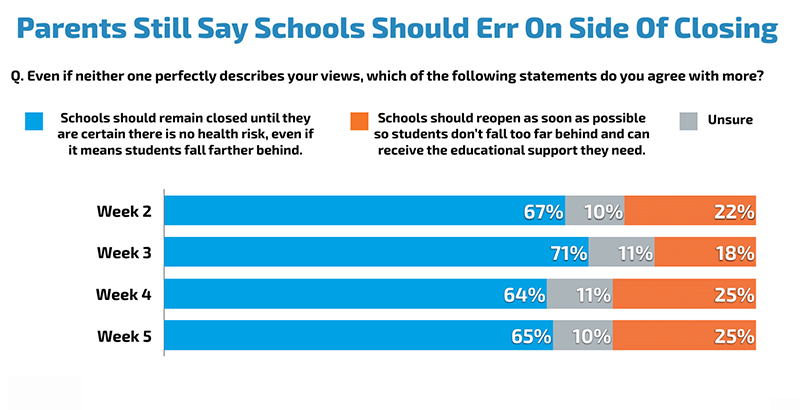Analysis: Week-by-Week Survey Shows Public School Parents Are More Worried That School Closures Are Harming Their Children

Parents of public school children increasingly believe that closing schools due to COVID-19 jeopardizes their child’s future.
This troubling news comes from a nationally representative survey of 500 public school parents and guardians who have been asked weekly since late April by Echelon Insights to describe the educational impact of closing schools on their children.
When asked about their uppermost concerns, three of the four top responses focus on education (the other worry was a family member getting the virus).
The top two, cited by 65 percent of parents, are whether their children will stay on track and be prepared for the next grade (up from 59 percent since April) and whether their children are missing important school social interactions with friends (up from 58 percent).
Sixty percent are very concerned that school closures negatively affect their children’s education, up from 55 percent. Parents also believe their children spend less time on schoolwork (40 percent, up from 38 percent) and learn less (46 percent, up from 40 percent) than they normally would when attending school.
On the positive side, they say schools are “excellent” or “good” at helping with continued learning — but fewer say that now than did in April (70 percent versus 74 percent).
Describing what type of assistance would be most helpful right now, three responses predominate: helping their children engage in good activities (52 percent, up from 46 percent); more information on how to support their child’s learning (30 percent, up from 28 percent); and access to high-speed internet (consistent around 30 percent).
Parents say it is “extremely” or “very important” that schools provide students with the technology and connectivity they need for the upcoming school year — a view held across income, racial and political groups, with support ranging from 70 percent to 84 percent.
Parents don’t want to rush reopening schools: 64 percent say they should be closed until there is no health risk, even if students fall further behind — though that’s down from 67 percent in April.
This majority, yet decreasing, support for keeping schools closed is similar to general public attitudes on keeping businesses closed, illustrated in a survey of 3,504 Americans conducted in late May and early June by Daniel Cox of the American Enterprise Institute. It reports that 58 percent of Americans want government officials to “take all necessary steps to ensure the public is safe even if it means keeping businesses closed longer and hurting the economy,” down from 78 percent in late March. Some 41 percent support allowing businesses to open “even if it means putting some people at risk,” nearly double 22 percent in March.
A majority or more of parents offer “strong” or “some support” for four procedures to be in place when schools reopen: notifying parents when someone in school becomes ill (63 percent); allowing vulnerable students and teachers to learn and teach from home (56 percent); providing mental health support for students and staff (52 percent); and requiring temperature checks when entering school (50 percent).
Parents also have clear-cut views on whose opinion they most trust in determining when and how school reopens. The federal Centers for Disease Control and Prevention (24 percent) is first, followed by state and local health officials (13 percent and 12 percent). Only then do they trust governors (9 percent) and school district leaders (8 percent). This indicates that school policymakers and leaders should prominently involve health officials in determining when and how schools reopen.
To sum up, COVID-19 confronts parents with unprecedented challenges as they strive to understand new and incomplete information on the disease and school closings. Their views change as they learn more. Health and education officials must listen closely to these views, exercising restraint and humility in their well-intentioned, authoritative efforts to say when and how schools reopen.
Here are four suggestions these officials should consider as they think about providing support to parents and reopening schools.
First, parents are increasingly worried about the negative educational impact school closures are having on their children. They want assistance now to deal with this.
Second, the percentage of parents not wanting to rush reopening schools is decreasing. This suggests there may be a limit to their tolerance for closing all schools for long periods.
Third, when schools reopen, parents want specific measures in place to protect their children and want reopening decisions to be a collaborative effort among health and school officials.
Finally, an unexpected 61 percent of parents across income, racial and political groups consistently say since polling began in April that in light of COVID-19, schools must rethink how students are educated.
These suggestions should catalyze health, education and other K-12 stakeholders to undertake new approaches to learning, instruction and health care that improve upon the current state of affairs.
Bruno V. Manno is senior adviser for the Walton Family Foundation’s K-12 education program. Walton Family Foundation provides financial support to Echelon for this poll and to The 74.
Get stories like these delivered straight to your inbox. Sign up for The 74 Newsletter

;)
